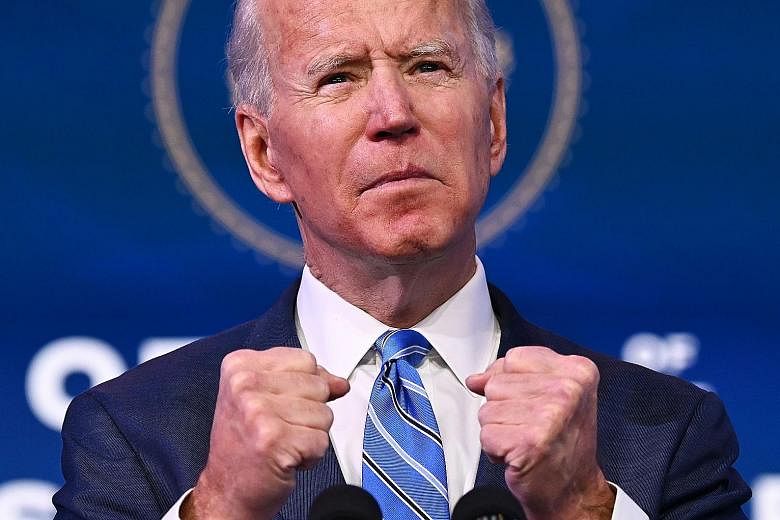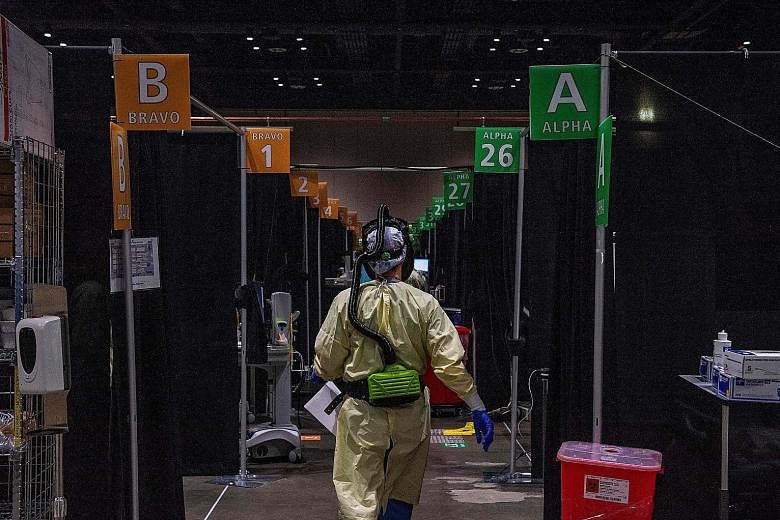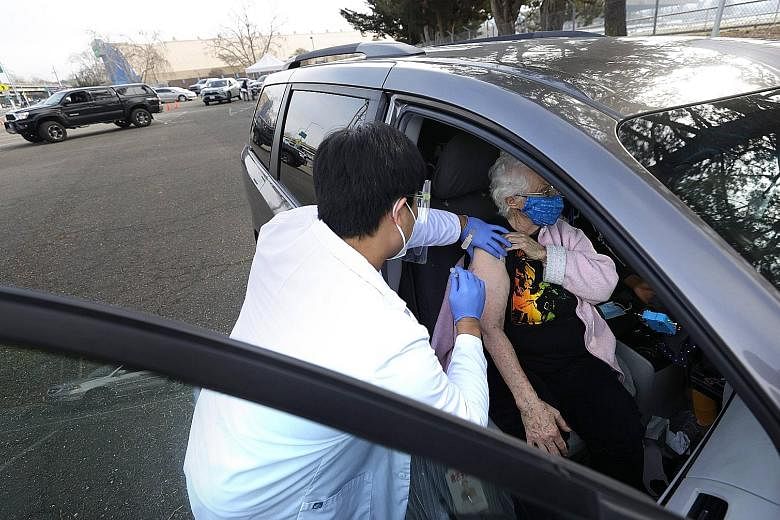WILMINGTON • US President-elect Joe Biden's US$1.9 trillion (S$2.5 trillion) economic relief proposal serves as the opening salvo in a legislative battle that could be prolonged by the go-big price tag and the inclusion of proposals opposed by many Republicans.
"A crisis of deep human suffering is in plain sight, and there is no time to waste," Mr Biden said on Thursday night, unveiling his plan. "We have to act, and we have to act now."
The aid package includes US$415 billion to bolster the response to the coronavirus and the roll-out of Covid-19 vaccines, some US$1 trillion in direct relief to households, and roughly US$440 billion for small businesses and communities particularly hard hit by the pandemic.
Stimulus payment cheques would be issued for US$1,400 - on top of the US$600 cheques delivered by the last congressional stimulus legislation. Supplemental unemployment insurance would also increase to US$400 a week from US$300 a week now, and would be extended to September.
The plan has elements that would likely appeal to enough moderate Republicans to gain favour in the Senate - including efforts to contain the virus and speed up the economy's reopening, as well as the additional direct stimulus payments.
Other parts are set to stir up partisan warfare, including Mr Biden's proposals to more than double the federal minimum wage to US$15 an hour, provide large-scale aid for state governments and offer higher unemployment benefits until September.
Negotiations could end up producing a smaller bipartisan package in the coming weeks, followed by a larger budget Bill later in the year with Democratic priorities.
Mr Biden said he plans to unveil a second major package, aimed at longer-term economic rebuilding, at a joint session of Congress next month.
Republican Senator Marco Rubio of Florida kicked off calls for breaking the relief plan into pieces, tweeting that as Mr Biden served in the Senate for more than 35 years, "he knows the plan he outlined tonight can't pass quickly". Mr Rubio called for proceeding with the US$1,400 stimulus cheques first.
Still, Mr Biden has several ad-vantages, including an ability to bypass Senate Republicans on some of the items using a special tool called budget reconciliation.
Enjoying Democratic control of Congress, Mr Biden will also have the White House bully pulpit to put pressure on Congress to act.
He has offered his plan as a way for the nation to come together to provide relief to impoverished Americans after the unprecedented mob violence in the Capitol last week, and amid the record spike in deaths from the pandemic.
"Unity is not a pie-in-the-sky dream, it is a practical step to getting things done," Mr Biden said on Thursday. "The very health of our nation is at stake."
-
KEY ELEMENTS OF STIMULUS PLAN
-
WASHINGTON • President-elect Joe Biden's team unveiled on Thursday a US$1.9 trillion (S$2.5 trillion) package that aims to revive the pandemic-damaged United States economy. Here are the main provisions of his American Rescue Plan:
1 DIRECT PAYMENTS
Mr Biden said the US$600 in direct payments to all individuals in the country that Congress approved last month was simply not enough, so his plan adds another US$1,400 to take the total to US$2,000. His plan will also raise the minimum wage to US$15 per hour to help the lowest-paid front-line workers, who are predominantly minorities.
2 MASSIVE VACCINE PLAN
The incoming president has pledged to massively ramp up nationwide vaccination to inoculate 100 million Americans in 100 days after taking office.
His plan provides US$20 billion to accelerate vaccine distribution and US$50 billion to expand Covid-19 testing.
The plan calls for creating community vaccination centres and deploying mobile units in hard-to-reach areas. It includes purchasing rapid-result tests and expanding lab capacity.
"The Biden administration will take action to ensure all people in the United States - regardless of their immigration status - can access the vaccine free of charge," according to a summary put out by the transition team.
3 STRUGGLING STATE AND LOCAL GOVERNMENTS
Mr Biden calls for US$350 billion in emergency funding for state, local and territorial governments, as well as US$170 billion for schools and institutions of higher education so they can reopen safely.
Throughout the pandemic, state and local governments have struggled to provide aid to residents, and because they cannot borrow money to finance operations, they could be forced to lay off thousands of teachers, police officers and firefighters.
4 EXPANDED UNEMPLOYMENT BENEFITS
The plan expands supplemental unemployment benefits to US$400 a week to help hard-hit workers who lost their jobs due to Covid-19, and extends the payments through September.
It also extends aid for workers who do not typically qualify for regular unemployment benefits, and provides up to US$1,400 a week in emergency paid leave to 106 million more Americans to reduce the spread of the virus.
5 HOUSING ASSISTANCE
Mr Biden will provide an additional US$25 billion in rental assistance to American families and extend the eviction and foreclosure moratoriums through September to avoid a wave of families losing their homes.
6 HELP FOR LOW-INCOME FAMILIES
In a bid to help more low-income working families through tax policy, Mr Biden will expand the earned income tax credit, raising the maximum benefit for childless adults from roughly US$530 to close to US$1,500, and raising the income limit from about US$16,000 to about US$21,000.
7 CHILDCARE
Millions of women have been forced to leave the workforce to care for children after childcare centres were forced to close.
Mr Biden's plan aims to address both issues - first with a US$25 billion emergency stabilisation fund to support childcare providers, including home-based centres.
In addition, he will expand the tax credit to reimburse families for half of their childcare costs so that those with two or more children will receive up to US$8,000.
8 SUPPORTING SMALL BUSINESSES
Mr Biden will build on aid provided in previous stimulus packages for small businesses, with US$15 billion "in flexible, equitably distributed grants that will help small businesses get back on their feet, put the current disaster behind them, and build back better".
AGENCE FRANCE-PRESSE, BLOOMBERG
Still, the looming impeachment trial of outgoing President Donald Trump is set to prolong the partisan tensions of recent weeks.
Unless incoming Senate Majority Leader Chuck Schumer and Republican leader Mitch McConnell strike agreement on procedures, it could prevent a floor vote on Mr Biden's Cabinet nominations and legislation for weeks.
"I know what I just described does not come cheaply, but failure to do so will cost us dearly," Mr Biden said, adding that economists, financial institutions and Wall Street banks supported the need for stimulus. "If we invest now - boldly, smartly, with unwavering focus on American workers and families - we will strengthen our economy, reduce inequality and put our nation's long-term finances on the most sustainable course."
The coronavirus relief-related funds will go towards a national vaccine programme, testing, investments for workers to carry out vaccine outreach and contact tracing, and money for states.
"The vaccines offer so much hope... but the vaccine roll-out in the United States has been a dismal failure thus far," Mr Biden said. "We will have to move heaven and earth to get more people vaccinated."
The US Chamber of Commerce said in a statement on Thursday that it "welcomes the introduction of President-elect Biden's American Rescue Plan", and singled out the vaccination focus for praise, while omitting comment on the minimum wage increase.
Mr Kevin Brady, the top Republican on the House Ways and Means Committee, said the package was bad for businesses. "Special interests and liberals are cheering. The jobless and Main Street are left shaking their heads."
But Democrats were uniform in praising the plan. Mr Schumer and House Speaker Nancy Pelosi pled-ged to work quickly to put "Biden's vision into legislation that will pass both chambers and be signed into law".
BLOOMBERG, REUTERS



